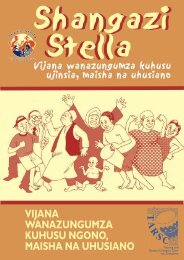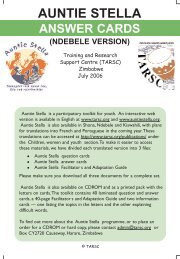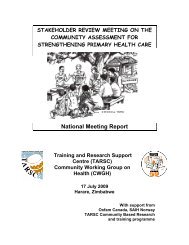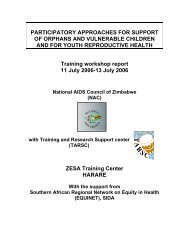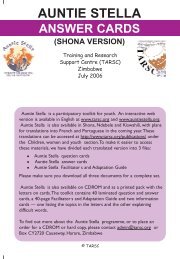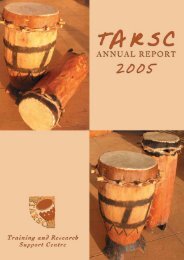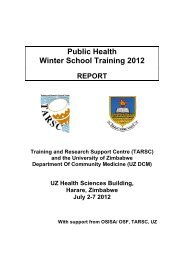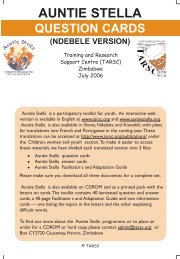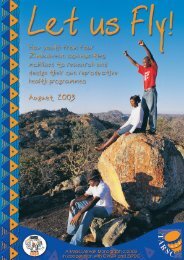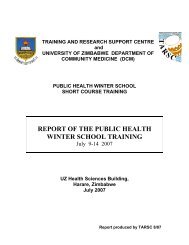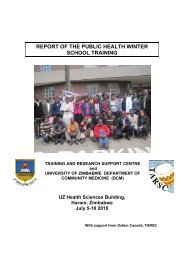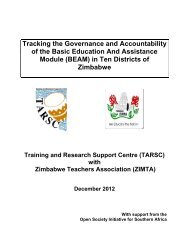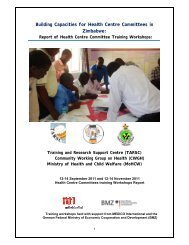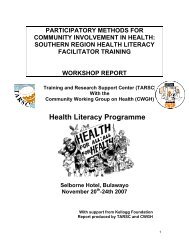HLregional meeting09.pdf - Training and Research Support Centre
HLregional meeting09.pdf - Training and Research Support Centre
HLregional meeting09.pdf - Training and Research Support Centre
You also want an ePaper? Increase the reach of your titles
YUMPU automatically turns print PDFs into web optimized ePapers that Google loves.
She added that it was clear from the introductions that Health Literacy provides the space for<br />
communities to express <strong>and</strong> shape the health policies <strong>and</strong> programmes, which are delivered to<br />
them. It also utilizes the expertise on-the-ground knowledge of the people working in health care,<br />
which is key in any planning <strong>and</strong> further strengthening of health systems in the region. People<br />
centered health systems are organized to involve <strong>and</strong> empower people, <strong>and</strong> create powerful<br />
constituencies to protect public interests in health. Furthermore, she observed that building health<br />
literacy in communities across the region will increasingly build informed, concerted public leadership<br />
for people centered, Primary Health Care oriented health systems. Health Literacy is investing in the<br />
public, parliamentary <strong>and</strong> civil society institutions <strong>and</strong> is creating mechanisms that empower people<br />
through participatory processes that engage <strong>and</strong> build power within communities<br />
Dr Loewenson introduced Ms. Fortunate Machingura to give an overview of the Health Literacy<br />
programme in the Region. She noted that Ms Machingura has been coordinating the Programme<br />
since its inception from the <strong>Training</strong> <strong>and</strong> <strong>Research</strong> <strong>Support</strong> center (TARSC) in Zimbabwe providing<br />
mentoring, support, <strong>and</strong> coordination in all the implementing country partners in the region. TARSC<br />
has provided institutional co-ordination to the programme over the past two years through technical<br />
input <strong>and</strong> oversight of Dr Rene Loewenson, programmes <strong>and</strong> technical teams <strong>and</strong> an administration<br />
unit. The skills <strong>and</strong> capacity input has been used to guide, manage, document <strong>and</strong> administer the<br />
programme <strong>and</strong> to report on it to country partners <strong>and</strong> key stakeholders.<br />
3. Overview of the regional HL Programme<br />
Ms Machingura began by linking her presentation to Dr Rene’s summary from the Introductions. Ms<br />
Machingura argued that the pillars (Participation <strong>and</strong> involvement; power <strong>and</strong> control; <strong>and</strong><br />
empowerment) from the introductions were the main anchors of Health Literacy <strong>and</strong> defines the<br />
identity <strong>and</strong> forte of Health Literacy in the region. Health Literacy is the social empowerment<br />
process that is revitalizing primary health care <strong>and</strong> redefining people centered health systems.<br />
Health Literacy provides useful opportunities for civil society <strong>and</strong> communities to lever government<br />
action to enhance health equity based on fundamental principles of health as a human right.<br />
People centered health systems are organized to involve <strong>and</strong> empower people, <strong>and</strong> create powerful<br />
constituencies to protect public interests in health. Health Literacy is organizing people ‘s power to<br />
control resources for health. Ms Machingura added that the Health Literacy Work in the Region has<br />
involved members of parliament who have a role in the region in advancing health equity through<br />
laws, budgets <strong>and</strong> social empowerment.<br />
Ms Machingura highlighted that the regional health literacy programme in east <strong>and</strong> Southern Africa is<br />
being implemented through TARSC Zimbabwe in co-operation with the Community Working Group<br />
on health (CWGH) Zimbabwe, with Malawi Health Equity Network (MHEN) Malawi, BONELA <strong>and</strong><br />
BFTU Botswana <strong>and</strong> the Regional network for Equity in health in east <strong>and</strong> southern Africa<br />
(EQUINET). The programme aims to support the development <strong>and</strong> use of participatory health<br />
education materials for health civil society. It is being implemented in Zimbabwe, Malawi <strong>and</strong> in<br />
Botswana with support from Kellogg Foundation.<br />
<strong>Training</strong> <strong>and</strong> <strong>Research</strong> <strong>Support</strong> <strong>Centre</strong> (TARSC) Zimbabwe is a non profit organization that provides<br />
training, research <strong>and</strong> support services to develop social <strong>and</strong> organizational capacities within<br />
organizations to interact with the state <strong>and</strong> private sector on areas of social policy <strong>and</strong> socialeconomic<br />
development. TARSC provides technical support, mentoring, cadreship building <strong>and</strong><br />
11



